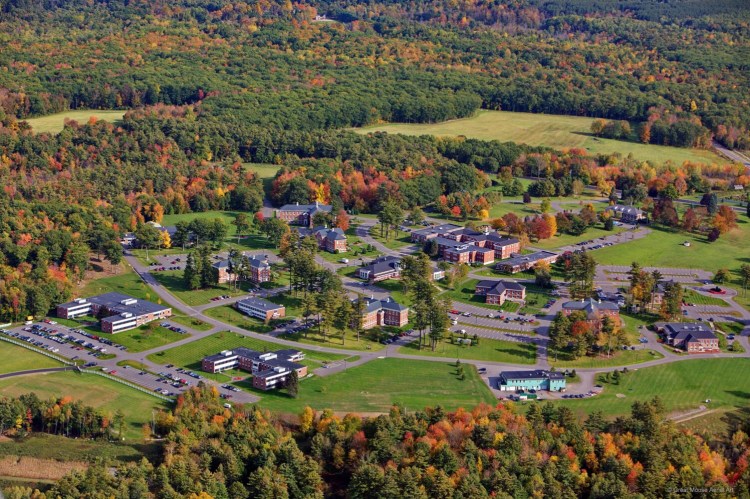After closing its campus for a year because of the coronavirus pandemic, Unity College is reopening its residential campus and branching out.
The college is reopening its central Maine campus in a few weeks, and this fall will open the new Technical Institute for Environmental Professions at Pineland Farms in New Gloucester – with a mission that’s both different from and similar to its parent college.
The institute will offer courses in environmental sciences, as the main school does, but the New Gloucester facility will be aimed more directly at creating a skilled workforce for careers that are expected to be plentiful in the next few decades, such as solar technicians and outdoor recreation specialists.
The goal will be to provide courses for those who are seeking special skills but not necessarily a four-year bachelor’s degree, said Dr. Melik Khoury, Unity’s president.
Unity has been working on the institute idea for about six years, Khoury said, and it’s part of an overall effort to extend the college’s reach beyond its campus in rural Maine. The college already built a distance learning program, which it relied on heavily to get it through the pandemic when the campus was closed and students were learning remotely over the past year.
Unity will welcome students back to campus next month, but the distance learning program, which predates the pandemic, will continue, and Khoury hopes to build on lessons learned during the pandemic. The distance learning program is geared toward nontraditional students who can’t or prefer not to attend daily classes on campus.
Roughly 700 students attended Unity in 2019, and the college had expected about 1,200 last year, but the pandemic disrupted its expansion.
About a year ago, the college announced that it was going to a full-time hybrid model that allows students to take some courses online and others in person, and also announced layoffs after deciding to close the campus for the 2020-21 year.
Administrators also floated the idea of selling the college’s Unity campus, although officials say that has gone by the wayside because of increasing enrollment for the fall term.
The college did lay off some employees last year but has since hired more than were let go.
Khoury said the New Gloucester program will focus on students who won’t live on campus, and the choice of a southern Maine site for the institute was carefully considered.
Unity wanted a site that was easily accessible to Maine’s population center, so students from Portland, Lewiston/Auburn and New Hampshire could easily commute, he said. It’s also aimed at attracting those for whom a four-year residential college may offer too much – or carry too high a price tag and time commitment.
The institute will draw on “folks who might already have a job or a degree or need to finish a (two-year) associate’s degree or are looking for a certificate or a credential,” he said.
Unity will work with local companies to help design courses to provide “a tie-in to the workforce” that those employers are looking for, Khoury said.

An exterior rendering of the planned Freeport Hall at Unity College’s Technical Institute for Environmental Professions at Pineland Farms in New Gloucester. Image courtesy of Sharon Picard
That also means speed, he said, and Unity hopes to have classes beginning every five weeks or so, although they might run as long as 15 weeks for more complex disciplines.
With a fall kickoff, “this will be very attractive to students and organizations that don’t want to wait until spring or next fall” to get started, he said.
Unity is still working on details of course offerings and will announce some in a few weeks, college officials said.
Khoury said the institute will offer some basic courses, too, but they will still tie into an overall mission of creating and catering to the workforce. For instance, writing courses might be available, but they will be geared toward students who might need to polish those skills for their jobs, he said.
Unity is spending the summer renovating one of the old halls on the Pineland Farms site, which had been a state-run psychiatric hospital until 1996 and has been transformed into a working farm and business center by the nonprofit October Corp., an arm of the Libra Foundation.
Freeport Hall is one of the larger buildings on the site and should provide room for dozens of class and meeting rooms, Unity officials said.
Khoury said the overall goal of both the distance learning programs and the institute is to enhance the reach of Unity beyond what people might expect from a small college in rural Maine.
He sidestepped questions about whether Unity’s reputation as a college with expertise in environmental fields might carry greater weight under the Biden administration than it had under President Trump, whose administration questioned whether climate change is real, and criticized alternative energy sources, such as windmills.
Khoury said environmental concerns should transcend partisan politics.
“Political rhetoric stops us from dealing with the problem at hand,” he said.
Send questions/comments to the editors.




Comments are no longer available on this story